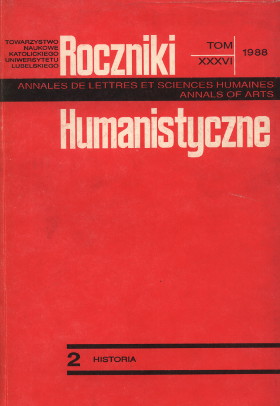The Catholic Student’s Association „Juventus Christiana” (1921-1949)
Abstract
Juventus Christiana was one of the most interesting Catholic student organizations in Poland. It was founded in 1918 in what used to be the eastern border areas of the First Republic (Minsk Litovsk) as an organization for secondary school pupils. Its activities were suspended as a result of the war of 1920 and of the subsequent migration of the Polish population from the area (Minsk remained within the USSR). It was revived in Warsaw in 1921 as an organization of university students, first grouping chiefly young people from the eastern borderlands. It gradually became more and more popular in Warsaw, as did its founder, Father Edward Szwejnic (1887-1934), who became the first pastor of students in 1928.
Juventus owed its popularity to its ideological and organizational principles. The members’ primary aim was to gain a deeper knowledge of Christ’s teaching and of its implications for individual and social life. This was done in small groups (up to twenty people), which worked under the direction of a „counsellor”, who was usually a priest. The self-education was based on the Gospel: it was read and discussed together and its precepts were adapted to contemporary life. The counsellor clarified controversial points or summed up the discussion when necessary. The truths learned in this way were both abiding and regarded as one’s very own. It was uncommon in Warsaw at that time for the Gospel to be shown to young people as the basis of religious and social formation. That is why many priests initially viewed Father Szwejnic’s work with distrust, seeing Protestant influences in it, especially as his father and his brother were Protestants and his uncle was a Protestant minister. Father Szwejnic also broke with the Sodality model. Juventus was coeducational; it did not impose any religious observances on its members beyond those binding upon all Catholics; religious practices were to be the result of formation rather than a means towards it.
The organization grew rapidly. At least 700 people were active in it in the years 1921-1939, mainly in Warsaw. The Poznań and Vilna branches were small, while in Lvov Juventus was organized as late as 1938 and the war stopped its growth. Graduates stayed in touch with Juventus, and they even set up and „Association of Juventus Seniors”, which integrated them as a group while also collaborating with the academic organization. This was especially important after 1933, when new regulations forced the abolition of inter-university organizations. The Seniors then became the centre of the entire Juventus movement. There were many other integrating factors: students’ ministry run by the priests guiding Juventus, study of the Gospel, social meetings, organization symbols (badge, flag, oath), organization holidays, common initiatives (such as Bible weeks at the university), Circle of Instructors, common retreats, excursions and holiday camps.
Juventus was the only Catholic students’ organization in Warsaw to remain active throughout the Nazi occupation. One of its members was the chairman of the Union of Catholic Student Organizations (1943-1945). After liberation Juventus resumed its activities in many universities and colleges (Warsaw, Cracow, Poznań, Łódź, Lublin). In 1949 new state regulations made it impossible for Juventus to continue its work. Its living legacy, especially after Vatican II, is the tradition of work with students being firmly rooted in biblical foundations, which ought to form the personality of the modern Christian.
Copyright (c) 1988 Roczniki Humanistyczne

This work is licensed under a Creative Commons Attribution-NonCommercial-NoDerivatives 4.0 International License.





